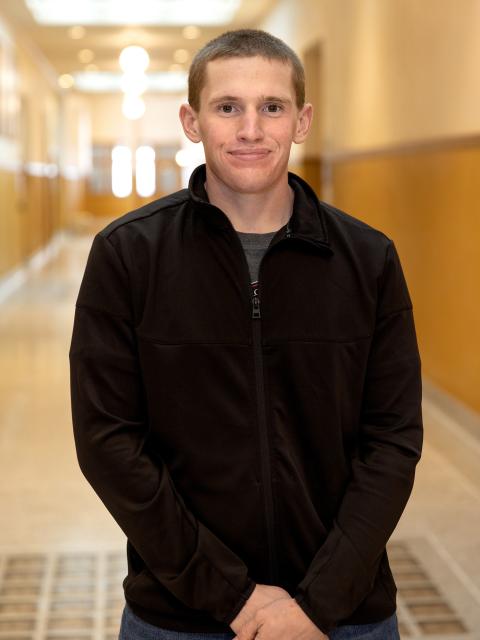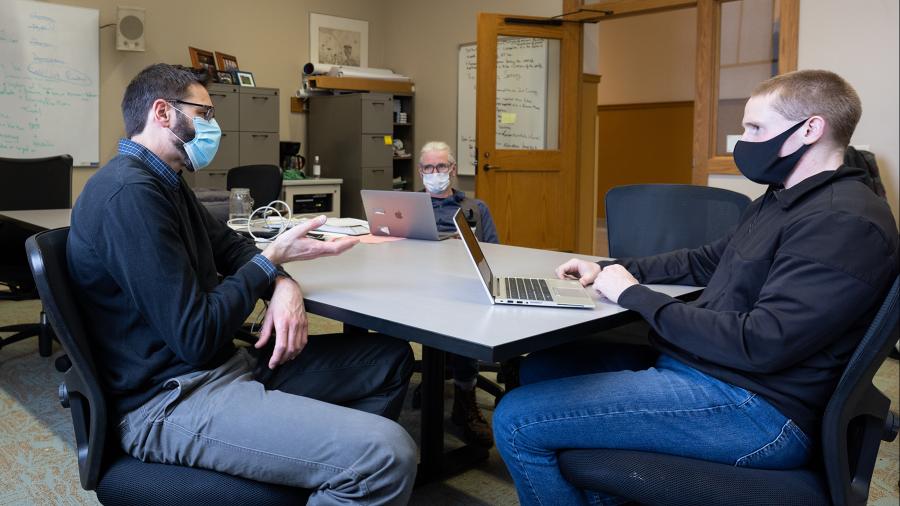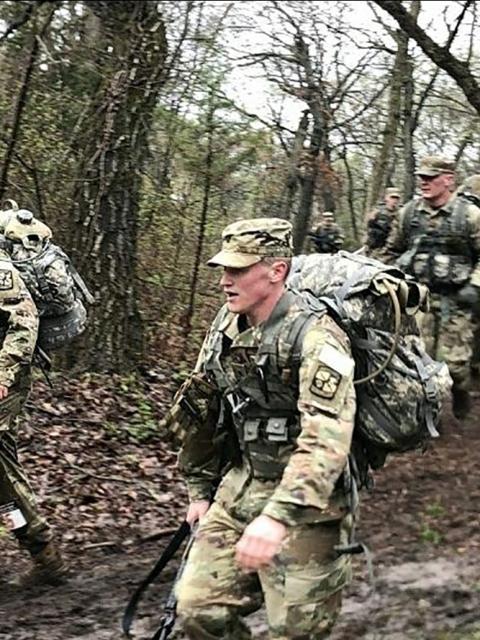DJ Walker has a big-picture outlook on life. He is in the Army ROTC program at University of Wisconsin-Stout and will serve as an officer after graduating. He is interested in politics and someday possibly studying constitutional law.
When the applied social science major considered a topic for his qualitative research class, he applied that broad perspective mentality to a national issue: Why do some people get the COVID-19 vaccine while others choose not to?
Then the Menomonie native and resident brought his topic down to size and researched it on the local level, interviewing a small sample of Dunn County residents, where the vaccination rate is 50.4%. The state average is 63.9%.

“This was an interesting phenomenon that I wanted to understand. I wanted to investigate if there were any connections or themes that appeared with people who chose not to receive the vaccine, or for that matter people who were willing to get the vaccine,” Walker said.
The major theme that emerged among the unvaccinated was distrust. “This included distrust in the ‘mainstream’ and ‘corporate’ media, distrust in governmental agencies such as the CDC and FDA and distrust in ‘big pharma’ and its monetary focus. The people who did not get the vaccine said they were tired of being lied to, misled and put through the ringer by these different institutions,” Walker said.
Those who did get the vaccine cited no general objection to vaccines, belief that vaccines historically have been effective and because of issues related to their jobs.
Walker’s results will be presented on Wednesday, March 9, in the state Capitol as part of the UW System’s annual Research in the Rotunda event. “To Have or Have Not: Local Residents’ Response to the COVID-19 Vaccine” will be one of five research projects from six UW-Stout students. The others and their faculty advisers are:
- Ron Barutha, of Hales Corners, senior, applied social science, “Highways: Lifelines of the Economy”; Zach Raff
- Laney Kaneski, of Minneapolis, senior, mechanical engineering; and Grayson LaCombe, of Minneapolis, senior, mechanical engineering and applied science, “Updating Residential Building Codes to Allow for a Carbon Free Future”; Monika Herrmann, Abhishek Verma
- Dylan Neilson, of Appleton, junior, applied social science, “Coping with COVID: A Phenomenological Study of Students with Mental Health Issues”; Tina Lee
- Logan Willits, of Genoa City, senior, applied social science, “The Effects of Title 3 Funding on Senior Students’ College Attainment”; Lee and Raff.
Students, along with Chancellor Katherine Frank and other school officials, will present research posters to state legislators and officials. The 18th annual event, free and open to the public, is from 10:30 a.m. to 2:30 p.m., including remarks at noon by UW System President Tommy Thompson.

UW-Stout’s participation is being coordinated through the Office of Research and Sponsored Programs.
“The UW System Research in the Rotunda is a wonderful opportunity to learn about the exciting research not only happening at UW-Stout but throughout the state of Wisconsin,” said Anne Hoeltke, ORSP director. “It gives our students and faculty advisers an opportunity to demonstrate their research with state leaders and their legislators. It also gives our students the opportunity to build leadership skills while meeting Stout’s mission in solving real-world problems, growing the economy and serving a global society.”
An objective approach
In the applied social science program, Walker’s concentration is history and politics.
“I am fascinated by things that have political implications, so the COVID-19 vaccine fit the bill perfectly for my class,” he said. “Qualitative research involves interacting with people and gathering data on a deeper level than obtaining information from a rote survey. This kind of research involves interacting for extended periods of time with those who are being studied.”
Professor Thomas Pearson guided Walker through the many steps of the research process, including how to narrow his topic and use standard methods to analyze the results.
“I learned how to sift through the many transcripts with a lot of details and determine what information I needed to pull out in order to paint a clear picture. This challenged me to use critical thinking. This was not an easy task, but it is something I improved on as the semester progressed,” he said.
After seeing the project develop, Pearson suggested that Walker take part in Research in the Rotunda.

“D.J. has taken on a timely and important issue in a thoughtful and open-minded manner. Vaccine uptake has been below average in Wisconsin and alarmingly low in rural areas. Understanding the beliefs that inform people’s decisions to receive the vaccine or that shape their hesitancy has significant public health implications and may inform future efforts to promote vaccination, which is a crucial tool in mitigating the impacts of the ongoing COVID-19 pandemic,” Pearson said.
Pearson added that Walker “has gone about his research in a nonjudgmental manner, seeking to genuinely understand how different beliefs, attitudes and world views influence perceptions about vaccines. In many ways, D.J. is a model student. He performs exceptionally well in his classes, is curious and asks excellent questions and has developed a research project with real-world implications. This is applied social science at its best.”’
Walker thanked Pearson and Professor Tina Lee, the applied social science program director. “They have all contributed to shaping me into the person I am, and I would not be where I am today without their support, guidance and challenging me to work hard to be the best that I can possibly be.
“Stout offers so many unique opportunities as a polytechnic that even if a person is not in the STEM fields the hands-on opportunities that the faculty help provide are invaluable; it is what makes Stout special. My cohort of peers have real life opportunities that may not always be present even at larger universities in the social science fields,” Walker said.
He is working on a minor in military leadership as part of his involvement with the Northwoods Battalion of UW-Stout’s Reserve Officers’ Training Corps program. After graduating in May 2023 and completing his military commitment as a commissioned officer, he is considering attending law school or going to graduate school for history or political science.
Walker has visited Panama and has family members who have lived on several continents, including working as missionaries. He’s thankful for the opportunity to attend college, something he may not have been able to do in another country or at another time in history, he realizes.
“This research and the opportunity to present have only furthered my desire to understand why things are the way they are so that decisions politically and the like may be made to help the people live out the American dream,” he said.
###




